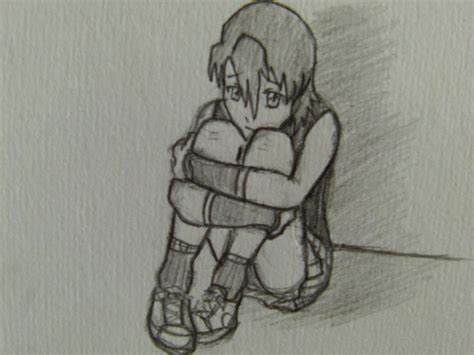Insulting or Not Insulting: Here is the Answer

The French luxury brand Dior recently published a photo sparking controversy in China. Most Chinese felt insulted, but there were also some Chinese who did not care. Indeed, similar events happened frequently in recent years, and the Chinese’s opinions often diverged. I picked four exemplars and will discuss them one by one in this blog post. By analyzing people’s psychological activities during these events, I intend to answer the big question of what counts as an insult. Hopefully, my answer can satisfy all Chinese, regardless of their political alignment.
Table of Contents
- Yua Mikami and Han Costume
- Namewee and Fragile
- Chen Man and Dior
- Dolce & Gabbana and Chopsticks
Yua Mikami and Han Costume
In September this year, Yua Mikami, a famous Japanese Adult Video (AV) actress, was besieged by Chinese netizens. They criticized her for a rather revealing version of Hanfu, the traditional clothing for Han Chinese, the major ethnic group in China. This version had a low V-cut and transparent sleeves, erotically showing off her cleavage. A group of Chinese people was angry, and they accused her of insulting the Chinese culture.

To judge whether Mikami insulted the Chinese, we must first find out why these Chinese people were angry and who they were. It appears that there exists a rehabilitation group in China, and they established the so-called Hanfu subculture. By wearing ancient clothes publicly, they express their love for tradition. Moreover, by making allies with the Chinese culture, they distinguish them from the average Chinese and label them as highly cultivated.
Mikami’s fault was not her revealing Hanfu but her identity as an AV actress. Because of her, the Hanfu subculture was tainted with pornography, arguably the most deadly sin in modern China (since 1949). Mikami made those Hanfu lovers fall from the upper body of the chain of contempt down straight to the lowest social layer. Their carefully maintained social image was ruined, and their social credit scores annihilated. They won’t get respect anymore, and they can’t find a husband/wife with quality. Mikami destroyed their life.
This reasoning is not that hard to understand. Let us consider how pornography is Not Safe For Work (NSFW) in western countries. Employers banned pornography in work because they consider sex work as a dirty job. They don’t want their “prestigious trade” to be associated with the dirty one. With the same reasoning, those Hanfu lovers consider Yua Mikami or, more generally, pornography Not Safe For Hanfu. They don’t want their “prestigious culture” to be associated with that dirty hobby.
What the Hanfu subculture and corporations share in common is that they are all business. The Hanfu subculture is not a mere hobby. Two persons often become friends for the mutual love for a hobby. If they truly loved Hanfu, they would have befriended Yua Mikami. For them, the Hanfu subculture is, instead, a trademark, which they would do well to forbid others to use. With that trademark, they can harvest respect, win social credit scores, and find partners with high quality.
Does Yua Mikami understand that? I don’t think so. This convoluted and twisted mind game is too complicated for Mikami’s womanish brain (doge). I dare to bet that even Harvard professors won’t be able to dig that deep. For Mikami, she simply wanted to use Hanfu as a tool to show off her prideful body, just like a data scientist using an NVIDIA GeForce RTX 3080 GPU to train a deep neural network. Not only did Mikami not insult Chinese, but also she is probably too innocent to even imagine her action could harm some other people’s business.

Namewee and Fragile
Last month, a Mandarin single named Fragile by Malaysian singer Namewee and Australian singer Kimberley Chen went viral. It satirizes the social issues in China, the political status of Taiwan, the Xinjiang internment camps, censorship in China, and the little pinks’ response. State-owned tabloid Global Times claimed that it had “insulted the Chinese people.”

In my opinion, if something is true, then it cannot be an insult. For instance, when Nicolaus Copernicus and Galileo Galilei raised Heliocentrism, did their claim insult the Earth and humankind? The church was sure to feel offended and would do well to burn them. However, truth is truth. It is always there, and it does not change because of your feeling or emotion. You can avoid hearing the truth by burning them, but you cannot alter the truth. Therefore, the truth can make you uncomfortable, but it can never be an insult.
Namewee’s song is an accurate description of the current state of China and the Chinese. It is a criticism but not an insult. When a parent criticizes his child for, say, his dishonesty, is it an insult? Criticism can help the child get rid of his bad behavior and hence improve himself. An insult, instead, is a distortion of reality, which aims at either demoralizing the target or boosting the issuer’s ego. What lies behind the criticism is love and attention, and what lies behind insults is hatred and impatience.
I believe what motivated Namewee’s creation of Fragile was his love and attention to Chinese people. This love is even better demonstrated in his new song, The Wall. If in Fragile, Namewee roasted China and Chinese people in an aggregated way, in The Wall, he distinguished Chinese people from China. The song has a peaceful and sad melody and conveys an amiable message. Strongly recommended.

Chen Man and Dior
Last Friday, French luxury brand Dior exhibited a photo featuring a Chinese model with “spooky eyes” and a “gloomy face” holding a Lady Dior bag. This photo met harsh criticism from Chinese state media and Chinese netizens. Dior then quietly removed this photo without any explanation.
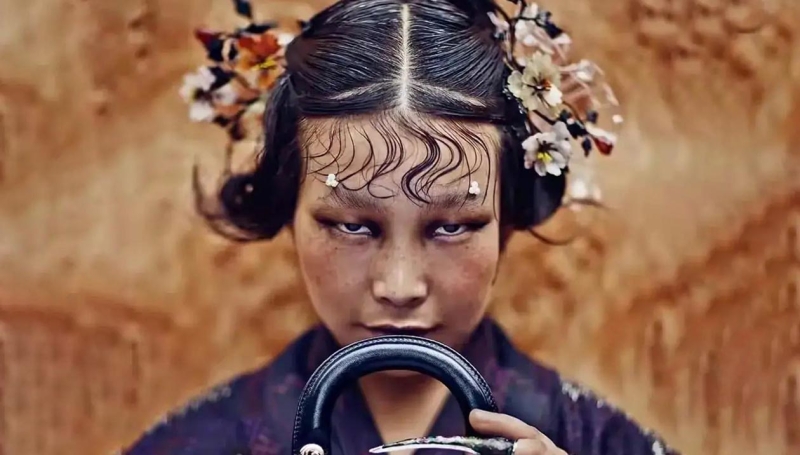
The model portrayed in the photo cannot remind me of any race existing currently or in history. Instead, the closest things I can imagine are bats, zombies, and black death, which all point to COVID–19. Was Dior insinuating that the Chinese were like virus-carrying zombies, spreading the disease all over the world?
I looked up the photographer of this photo, whose name is Chen Man. Chen Man is a world-famous Chinese female photographer, best known for her 12 Chinese Colors Series. As is shown below, no matter how the photo color varies, what stays permanent is the model’s stereotypical eyes.
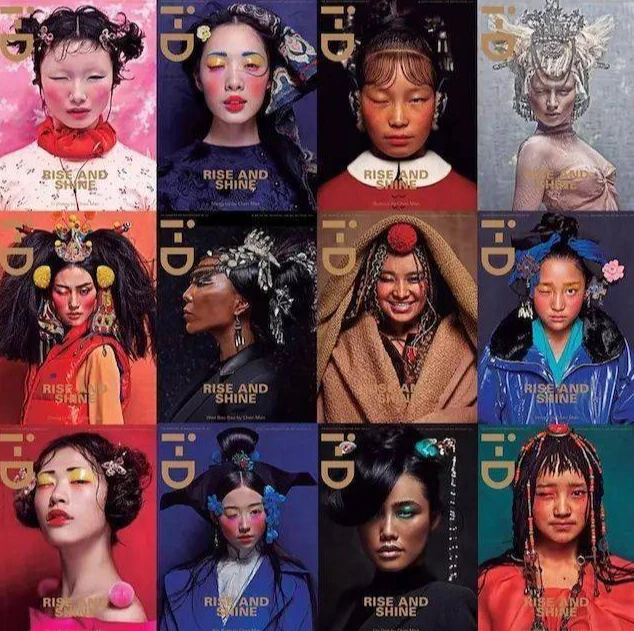
Here is more:
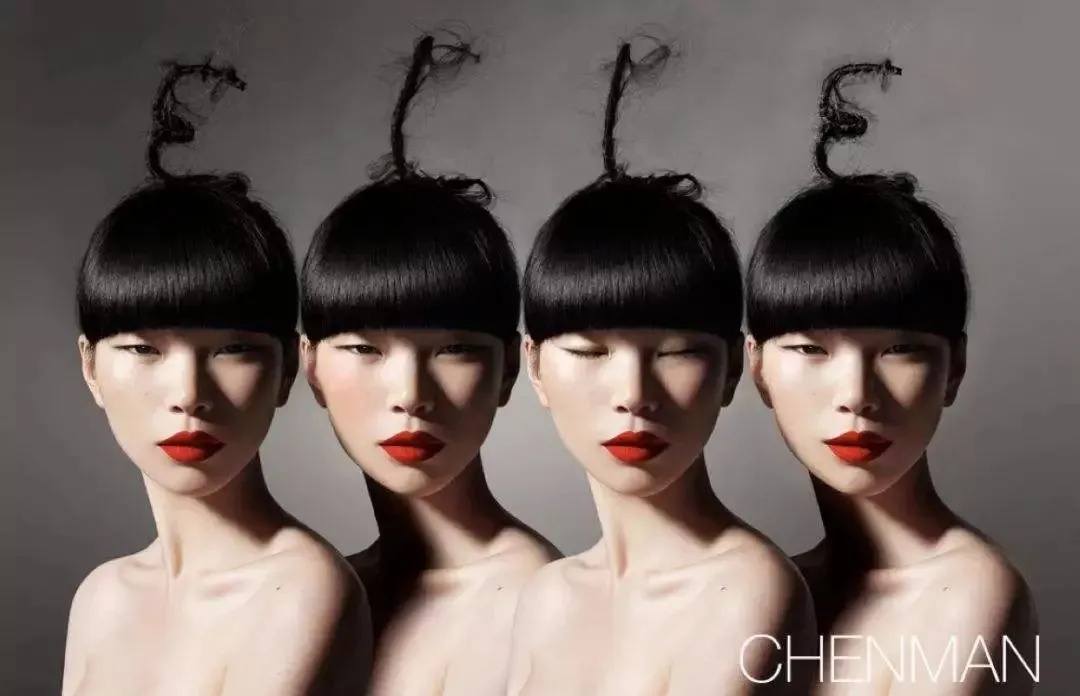
I was curious about how Chen Man herself looks like, so I found this:

Does she think that her 12 Chinese Colors Series illustrates beauty? Probably not. If that had been the case, she would have dressed like that and worn makeup shrinking her eyes, just like how Yua Mikami dressed in Hanfu.
If she is not a big fan of her photos, why did she portray Chinese women like that? The only viable explanation is that she met the glass ceiling in the fashion world dominated by white people. No matter how hard she tries, she cannot have a place if all she knows doing is mimicking the western style.
To break this stalemate, she invented the artistic style that I called Chinese Women with Chen Man’s Characteristics. By shrinking the model’s eyes, she satisfied white people’s arrogance, ignorance, and stereotype. By distorting Chinese women, she artificially created a niche area where she is the sole domain expert. That is how she won her place in the fashion world.
Chen Man’s success undoubtedly inspired some copycats. On June 15th of this year, students of one of the Top 2 Universities in China, Tsinghua University, published their degree-winning designs, predominantly featuring Chinese Women with Chen Man’s Characteristics. It seems that Chen Man has indeed become the Godfather of this niche area.
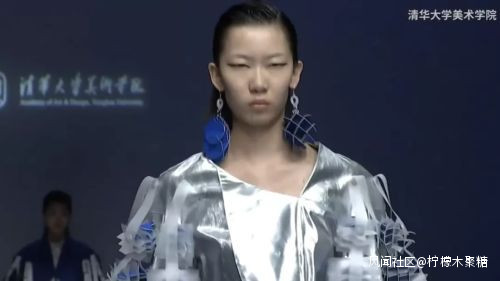
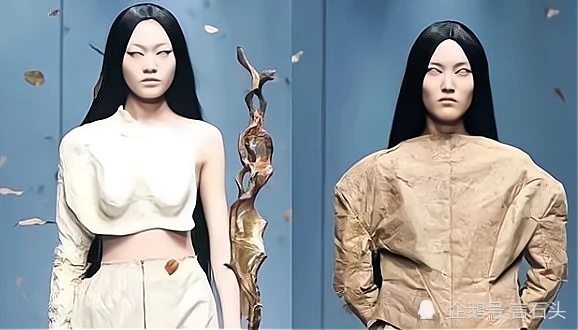
Does Chen Man have faith in the religion she established? Probably not. For Chen Man, it is about business, not art. For success, she is ready to sell away Chinese Women.

So did Chen Man insult the Chinese? Probably worse. Chinese women are just leek for her. More accurately, Chinese women are just stepping stones for her career success. Chen Man has lost her bottom line, core value, and humanity. I agree with this post where the author claimed that Chen Man was “morally bankrupted.”
With this understanding, now let’s revisit Dior’s photo at the beginning of this section. The model portrayed is no longer a human but a demon. By demonizing Chinese women, Chen Man manifested her eagerness to decouple with the Chinese. She no longer considered herself Chinese. Also, she probably no longer lives in China.
Dolce & Gabbana and Chopsticks
In 2018, Italian fashion house Dolce & Gabbana launched three short videos, which featured a Chinese girl struggling to eat pizza, spaghetti, and cannoli with chopsticks. These videos met a backlash in China and eventually the boycott of this brand.
In these videos, a male voice mansplained and gave instructions to the girl on how to “properly” eat the dishes. The girl acted like an idiot, using chopsticks in a funny and unusual way and covering her awkwardness with a stupid smile. The videos referred to the chopsticks as two “little sticks” but the pizza as “great Margherita”, which gives me the impulse to start my academic paper with “you retarded reviewers, kneel down and admire my great work.”
This part of the video can have two interpretations. It can imply that the Chinese civilization is an underdeveloped one and that they are confused when meeting a more advanced civilization. Alternatively, you can also interpret it as a political satire, referring to the so-called Socialism with Chinese Characteristics. The weirdness of the Chinese regime is just like eating Margherita with chopsticks.
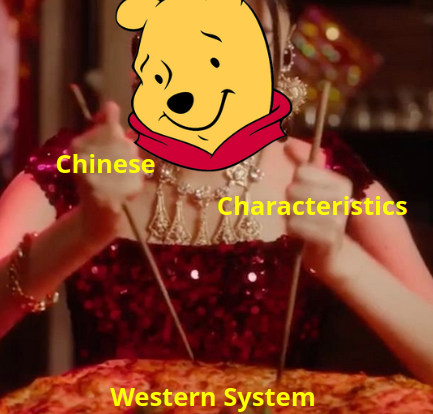
Unluckily, the recurrent sexual suggestions in the videos rule out the political interpretation. The girl was given an oversized cannoli, suggesting a white male genital part. The male voice teasingly asked, “is it still too big for you?” The girl acted like seeing a male genital part that huge for the first time in her life. She found a hard time suppressing her mixed feeling of surprise and excitement and, at the same time, did not know how to proceed.


It’s no wonder why the Chinese felt offended. I have done social experiments twice in France with the same arrogance but without the vulgar element. To make the interlocutor understand that it was meant to be a joke, I put on a big smile when conducting the social experiments. Even with my best-effort smile, they were still surprised and didn’t seem to appreciate my humor. Luckily, they didn’t call me out for that.
For the producer of these videos, was it just a bad joke? In a following private chat of Stefano Gabbana, co-founder of the brand, he called China the “country of crap” and “Ignorant Dirty Smelling Mafia.” At this moment, we could tell that he didn’t insult the Chinese purposely. He genuinely believed that the Chinese were lower-level creatures, and he was sincere about it. According to an anecdote, doctors and nurses in psychiatric hospitals won’t avoid the patients when changing clothes. Stefano Gabbana certainly didn’t mind exposing his dirtiest thoughts to the Chinese audience.

Ironically, Dolce & Gabbana used the hashtag #DGLovesChina when releasing these videos. DG does not love China. It never did. All it loves is money. Love is just a sweet word men use to coax women into sleeping with them. Dolce & Gabbana was making a fool of the Chinese.
This event was not only a PR disaster for Dolce & Gabbana, but also it changed the future of China. The Chinese were awakened. No matter how hard they try, they would never be accepted with kindness in the western world. All the nice things the western civilizations have done so far are not sincere. They are like the tricks pickup artists use to sleep with inexperienced girls. The Chinese would forever be that lonely boy in the corner, bullied by the western civilizations.
This feeling of being rejected coincidentally matches the Communist Party of China’s narrative about history, which portrays China as a victim in the early modern period. Only the Rise of China can save the Chinese from prejudice and mistreatment. Dolce & Gabbana gave Xi Jinping a handy tool, hatred, to reunite the domestic political power and launch the total confrontation against the western civilizations.
You can observe the influence of Dolce & Gabbana on Beijing in so many aspects. The Chinese wolf-warrior diplomats’ attitude shows the same arrogance as in DG’s videos. When China’s UK ambassador Liu Xiaoming accidentally liked a pornographic post on Twitter, Beijing mimicked Stephano Gabbana and used the excuse that Liu’s account was hacked. Beijing never apologizes or admits his wrongdoing, just like Dolce & Gabbana. Beijing saw that Dolce & Gabbana got away with their misdeeds and that no one was there to punish them, so Beijing started to do the same.
Forty years ago, Richard Nixon engaged China economically, expecting that a growing middle class would help establish democracy in China and hence help China join in the family of modern civilizations. This effort was ruined by Dolce & Gabbana, who showed that China was not a worthy family member and would never be. Chinese people were heartbroken and are now seeking revenge. An Italian luxury brand wasted generations of American people’s efforts.
Summary
Yua Mikami, Namewee, Chen Man, and Dolce & Gabbana were all doing business. What they share in common is that they all made some group of or all Chinese uncomfortable. However, the mechanism behind and their inner drives are much different.
- Yua Mikami was happily following her routine and adding various elements into her collection to better please men. She never imagined her action could harm some other people’s business.
- Namewee’s criticisms against China and the Chinese are based on his attention to China. His criticisms are on point, and China and the Chinese can indeed use his insight.
- Chen Man’s career success was thanks to her betrayal of Chinese Women. Her recent photo for Dior demonstrated her eagerness to decouple with China and the Chinese.
- Dolce & Gabbana was sincere in thinking that the Chinese were lower-level creatures. They did not even try to hide their racism.
| Subject | Object | Insulted? | Drive |
|---|---|---|---|
| Yua Mikami | Rehabilitation group | No | Interest |
| Namewee | China, Chinese | No | Attention |
| Chen Man | Chinese women | Yes | Egoism |
| Dolce & Gabbana | Chinese | Yes | Racism |
In these examples, Yua Mikami evoked our empathy, Namewee helped us reflect on ourselves, whereas Chen Man and Dolce & Gabbana disgusted us. Their intentions were different, so the outcome and the emotion they evoked on us were also different. After reasoning, we can understand and like Yua Mikami and Namewee, but we cannot forgive Chen Man and Dolce & Gabbana.
The intention is the ultimate criterion in the matter of insult. A malicious intention unquestionably foreshadows an insult. A benevolent one, however, can always evoke people’s empathy. Sometimes, people may feel offended for obscure reasons, but they never reject good intentions.
